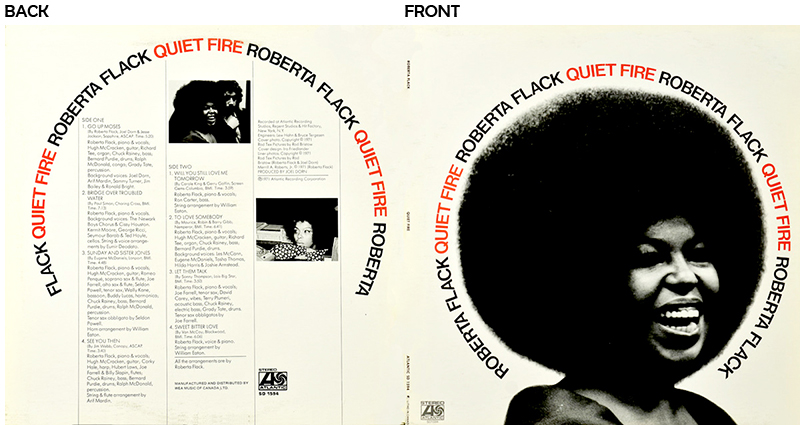| Back to Genre |
 |
|
 |
Rating: Excellent |
There is music that has fire without being loud. Quiet Fire, Roberta Flack's third studio album, is precisely that: a glow that slowly envelops you, burning softly, but never extinguished. The album was released in November 1971, at a time when her earlier work had remained relatively unnoticed. Only months later would "The First Time Ever I Saw Your Face" break through, but Quiet Fire already showcases everything that makes Flack unique. It is an album of inner strength, of silence that speaks, of intensity without display.
Flack opens the album with "Go Up, Moses," a spiritually charged call that, in her hands, exudes contemplation rather than struggle. She sings not to convince, but to touch. In a time when soul was often dominated by raw expression, Flack opts for something equally powerful: restraint. Her phrasing is controlled, but never detached. She breathes space into each song, as if she feels the words before speaking them. Her classical background is heard not in technical bravado, but in the way she uses dynamics and timing. Silence becomes part of the story.
The instrumentation is warm and lived-in. Bernard Purdie on drums, Chuck Rainey on bass, Richard Tee on organ—all musicians who understand the meaning of creating space. Arif Mardin's arrangements add strings and brass that come in at just the right moment, without ever overshadowing Flack's voice. Joel Dorn, her regular producer, ensures everything sounds clear without losing its shine. It's not a production designed to impress, but one that exudes confidence. A kind of tranquility rare on records of that era.
What makes this album so special is the variety of repertoire yet the unity of tone. Flack sings a gospel song, a Simon & Garfunkel cover, a folk ballad, and weaves it all into one story. Her version of "Bridge Over Troubled Water" isn't an imitation, but an interpretation. She slows down the tempo, emphasizes different words, and thus changes the entire meaning of the song. Where the original is grand and comforting, her version is intimate, almost modest. She doesn't offer salvation, but companionship.
In songs like "Sunday and Sister Jones" and "Sweet Bitter Love," she is at her most vulnerable. There's no embellishment or theatrical flourishes here, just a voice, a piano, and the truth of what she feels. The album's strength lies in its subtlety. Every word carries weight, every breath has meaning. Flack demonstrates that emotion doesn't have to scream to be heard. She chooses precision, and that makes her interpretations all the more compelling.
The album's reception was mixed upon release. Some critics found her too reserved, too controlled. But in retrospect, it's striking how coherent and progressive the record is. Instead of adapting to trends, Flack chose her own path. She created a soul album that refused to be "soulful" in the usual ways. This requires patience from the listener, but rewards those who persevere.
Quiet Fire appeared during a period when soul was splitting into multiple directions. On the one hand, there was the rise of funk and more explicitly political soul; on the other, singer-songwriters sounded more intimate than ever. Flack found herself somewhere in between, but resolutely chose her own path. Her music was both black and classical, personal and formally conscious. She didn't fit easily into boxes: too restrained for Motown, too well-schooled for folk, too feminine for male-dominated jazz. And that's precisely why this album stands up today. It's music that ignores systems, but relies entirely on sound, space, and content.
The album reached number eighteen on the US album charts and yielded a modest hit with "Will You Still Love Me Tomorrow." But it's in retrospect that it truly reveals its value. The album stands on its own. It's not a stepping stone to later fame, but a well-rounded work that showcases an essential part of her voice. Not the voice that yields hits, but the voice that remains.
The title sums it all up: a fire that doesn't erupt, but glows. An album that doesn't overwhelm you, but slowly gets under your skin. Anyone who puts it on today will hear an artist who dares to slow down, dares to wait, dares to be still. In that stillness lies the true intensity. Quiet Fire is a masterpiece of restraint. It's a lesson in listening and feeling, without needing to explain anything.
= Full Album Play List =
= Track List =